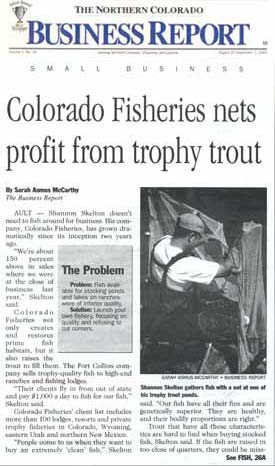If the fish are raised in concrete ponds, not only could the trout get damaged,
but they also don't know how to find their own food. CFI
raises their eight species in earthen raceway ponds. Earthen raceways have
several advantages over concrete, Skelton said.
"Earthen adds to quality," he said. "Concrete rubs fins off, and we get
natural aquatics."
The CFI ponds are full of shrimp, midges and other delicacies
on which the trout can feed. This way, not only are they healthy and well
fed while being raised, but they also know how to feed themselves once they
relocate to a private resort.
"Our fish are educated foragers as well," Skelton said. "Nowadays, a lot
of fish are raised only on pellets. Earthen is tougher to maintain, but
the benefits just totally outweigh the repercussions."
CFI uses pellets to supplement the natural
aquatics, and each pond has an automatic feeder in it. The fish learn that
by bumping a wire hanging from the feeder, food will fall into the water.
"Our fish are at an inch a month in growth at this facility," Skelton said.
"A lot of that has to do with water quality."
The earthen ponds are fed from the five irrigation wells on the property.
The temperature of this uncontaminated groundwater is fairly consistent
year-round, and the fishery can regulate the temperature if necessary.
Pond populations differ depending on the size of the fish. The ponds with
the smaller fish, or fingerlings, are home to about 20,000 trout.
Aerators pump 750 gallons a minute through the ponds to provide enough oxygen.
After the water is circulated, it is pumped out to a "tail" pond and then
used for crop irrigation.
The company started in Wyoming and still has a location in Albin, northeast
of Cheyenne. It opened the Colorado location about a year ago this month.
The fishery is located on 12 of the company's 80 acres east of Ault. Colorado
Fisheries has six ponds at this location, with plans to expand.
Right
now, after the fish grow to about a pound, they are usually moved to the
Wyoming facility. Skelton plans to add four ponds and a hatchery in Colorado.
The additional habitat will make it possible to keep the fish here as they
mature.
The
trout are sold by the pound at different ages, depending on the needs of
the client. CFI doesn't sell any trout that are under a pound.
The average is three to five pounds, but some 4-year-olds have gotten up
to 14. All together, the company sells more than 200,000 fish in a year.
|
Trout sales are only about 30 percent of the business, however. Habitat
design and restoration make up the rest. Having high-quality fish shows
clients that Skelton knows what makes trout thrive. "The fish are a foot
in the door," Skelton said. "Once they see our fish, they know we know what
we're doing."
Skelton has worked with fish for a long time. He was a professional fly-fishing
guide and fly tier for years. As a guide, he worked with some of the high-end
ranches. He started helping them to develop good fish habitat, and that
led him to raising trout.
"When we would go to stock, we were not happy with what we were getting,
so we decided to raise our own," said Skelton, who was featured on the cover
of the January 1998 Fly Fisher's Guide to Colorado. "That's one of the nice
things we bring is that we come from not only the fisheries side but the
angling side."
CFI has done a lot of work for cattle ranchers looking for
other ways to bring in revenue. Many times, the ranch was in the family
for generations, but it's become more difficult to make a living off of
it.
"A lot of ranchers are turning to us to create trophy fishing for vacationers,
and we're finding it's very successful," Skelton said. "Seventy percent
of the habitat work we do is with ranchers trying to save their ranch."
A lot of the business is acquired through word-of-mouth advertising. Many
clients are repeat customers and refer CFI to others in the
business.
"It's not just the fish, it's the knowledge and the service," Skelton said.
"Once people open the door to us, it stays open. They see our philosophy
and see that a lot of what we do we'd do for free if we didn't have bills
to pay." |
 Problem:
Fish
available for stocking ponds and lakes on ranches were of inferior quality.
Problem:
Fish
available for stocking ponds and lakes on ranches were of inferior quality.